 Petzlover
Petzlover Miniature Siberian Husky is originated from United States but Welsh Corgi is originated from United Kingdom. Miniature Siberian Husky may grow 9 cm / 4 inches higher than Welsh Corgi. Both Miniature Siberian Husky and Welsh Corgi are having almost same weight. Both Miniature Siberian Husky and Welsh Corgi has almost same life span. Both Miniature Siberian Husky and Welsh Corgi has almost same litter size. Miniature Siberian Husky requires Moderate Maintenance. But Welsh Corgi requires High Maintenance
Miniature Siberian Husky is originated from United States but Welsh Corgi is originated from United Kingdom. Miniature Siberian Husky may grow 9 cm / 4 inches higher than Welsh Corgi. Both Miniature Siberian Husky and Welsh Corgi are having almost same weight. Both Miniature Siberian Husky and Welsh Corgi has almost same life span. Both Miniature Siberian Husky and Welsh Corgi has almost same litter size. Miniature Siberian Husky requires Moderate Maintenance. But Welsh Corgi requires High Maintenance
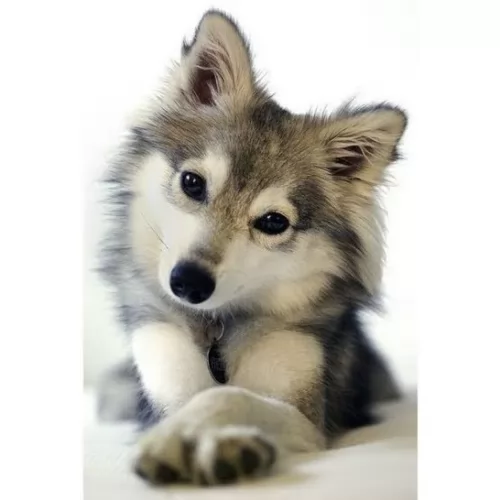 Miniature Siberian Huskies – also known as mini huskies – are your regular Siberian husky bred to be that much smaller than what the breed standard dictates.
Miniature Siberian Huskies – also known as mini huskies – are your regular Siberian husky bred to be that much smaller than what the breed standard dictates.
They’re sought after by those who love the regular sized Siberian Husky but who find the larger dog too large and boisterous. They come complete with the looks and the temperament of the Siberian Husky but they are smaller.
The origins of these gorgeous Mini huskies is conflicting though as some believe they originated in the USA. The name of Bree Normandin is bandied about when talking of the breed’s origin while other refer to Linda S. Spurlin from Alaska. She became interested in them when her full-sized husky became pregnant by a small dog.
Spurlin used Siberian and Alaskan Huskies as well as small Schipperkes and American Eskimo Dogs to bring about the mini version. They’ve got the same pedigree as the Siberian Husky, but it has been selectively bred for its smaller size, also coming from the Spitz family of dogs.
The Miniature Husky is genetically the same as the larger Siberian Husky and the AKC doesn’t recognize it as a separate breed, but sees it as a different size variation of the working-group Siberian Husky.
 The Pembroke Welsh Corgi and the Cardigan Welsh Corgi were once considered to be two types of the same breed. Today they are recognized as very different breeds, but cousins of sorts.. They are alike in many ways and very different in others. The general information in terms of height and weight above applies to the more popular and better known Pembroke Welsh Corgi, developed as a herding dog from the spitz line in Pembroke shire, Wales. The Pembroke is famous for being the breed favored since childhood by Queen Elizabeth, the current queen of England. It’s believed that the Pembroke came to the country around the 10th century with Flemish weavers. The Cardigan is thought to have come with the Norse people and be a relative of the Sedish Vallhund.
The Pembroke Welsh Corgi and the Cardigan Welsh Corgi were once considered to be two types of the same breed. Today they are recognized as very different breeds, but cousins of sorts.. They are alike in many ways and very different in others. The general information in terms of height and weight above applies to the more popular and better known Pembroke Welsh Corgi, developed as a herding dog from the spitz line in Pembroke shire, Wales. The Pembroke is famous for being the breed favored since childhood by Queen Elizabeth, the current queen of England. It’s believed that the Pembroke came to the country around the 10th century with Flemish weavers. The Cardigan is thought to have come with the Norse people and be a relative of the Sedish Vallhund.
The Cardigan Welsh Corgi, also a herding dog has their ancestry in ancient Celtic dogs. They are older than the Pembroke and hail from Cardiganshire, Wales.
Both breeds are friendly, smart and independent. Both dogs herd cattle and sheep. About the end of the 19th century, farmers in Cardiganshire began to raising sheep rather than cattle. The corgis were herding dogs for cattle. “Heelers” who avoid the cattle kicking them by nipping at the cattle’s heel. Pembrokeshore and Cardiganshire are counties in South West Wales that adjoin each other.
Then the move was made from cattle to sheep in Cardiganshire they bred their corgis with the Welsh Sheepdog where the merle color is said to come from, and the Pembroke Welsh Corgi. This caused the similarities between the two dwarf breeds. At the same time the distance grew between the two breeds and they grew into very distinct and different looking dogs. There are also some differences in their personalities.
The first corgi to appear at Crufts came in 1927 and in 1928 a Pembroke won a championship at Cardiff for the first ever corgi win. It was not until 1934 that the kennel club recognized them as separate breeds rather than a Pembroke shire type and a Cardiganshire type. From this point on the two are separate breeds with tremendous similarities. A Pem won the Reserve Best in Show at Crufts in 1955.
The first corgi came to the United States in 1933 by a breeder of Old English Sheepdogs. In 1934 the American Kennel Club (AKC) recognized Corgis as one breed with 2 types. The Pembroke has always been the more popular of the two.
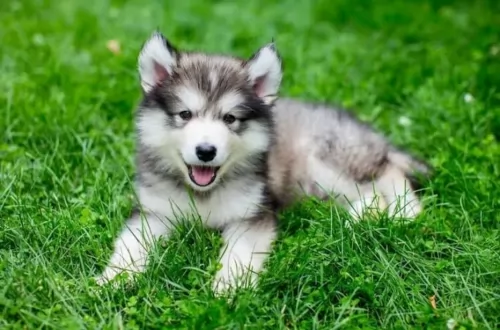 Known also as the Alaskan Klee Klai,the Miniature Siberian Husky stands at 33-39cm in height and weighs between 8 - 11kg.
Known also as the Alaskan Klee Klai,the Miniature Siberian Husky stands at 33-39cm in height and weighs between 8 - 11kg.
These mini huskies are like the larger huskies and can also come in a range of color variations such as grey and white, black and white or red and white for instance. In typical Spitz dog fashion they have the erect ears and long bushy tail. A striking feature of these dogs is the beautiful eyes – they can be brown but also a mesmerising blue.
This Miniature Siberian Husky is an intelligent dog and you’re not going to have any trouble with him teaching him some basic commands such as sit, lie-down and stay.
You need to know that these dogs aren’t going to be content lying around all day and that they want to be kept busy almost around the clock. They have always been working dogs so he will need plenty of mental – and physical exercise to keep him content. A bored, frustrated Mini Husky will just develop problem behavior through no fault of his own. People who buy high energy dogs have a responsibility towards them to keep them busy and well exercised.
These dogs are similar to their genetic ancestor, the wolf, and instead of barking, you may find him trying to communicate with a howl. One thing is sure, they make great family pets, and their gentle nature allows them to get on well with children and also not to show aggression with other dogs. They’re loyal, outgoing and charming.
 They used to differentiate between the Cardigan and the Pembroke by saying the Cardigan was the one with the bigger ears and the Pembroke had no tail. In many parts of the world where tail docking has been banned, most Pembrokes now have tails. Only those born without don’t have them. Both dogs are long and low to the ground with big chests and short legs. This is because they are dwarfs. They are not little dogs.
They used to differentiate between the Cardigan and the Pembroke by saying the Cardigan was the one with the bigger ears and the Pembroke had no tail. In many parts of the world where tail docking has been banned, most Pembrokes now have tails. Only those born without don’t have them. Both dogs are long and low to the ground with big chests and short legs. This is because they are dwarfs. They are not little dogs.
The Cardigan Welsh Corgi is heavier boned than the Pembroke, has large rounded ears and a flowing, fox like tail. The Cardigan comes in a variety of colors but never predominately white. He is double coated with a dense, harsh outer and a soft, short and thick undercoat.
Pembroke is smaller and longer than the Cardigan with pointed ears. They are intelligent, sturdy and strong with tremendous stamina. The tail is docked in the United States or the pups are bred not to have a tail. This was originally so that the cattle could not step on their tails and injure the dogs. The double coat on the Pembroke is short and weather resistant inner coat with a longer and rougher outercoat. He has the same deep dropped chest as the Cardigan. Both corgis shed voraciously.
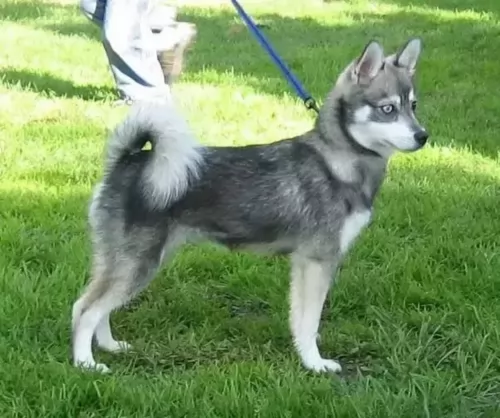 Your cuddly Mini Siberian Husky is such an intelligent dog, active and social and guaranteed to make you a splendid pet.
Your cuddly Mini Siberian Husky is such an intelligent dog, active and social and guaranteed to make you a splendid pet.
Being somewhat wary and aloof with strangers, they also make good watchdogs. They do well with children who have been taught to be kind and gentle with animals.
With good care your dog can reach up to 15 years of age, providing you with many years of superb friendship.
 1Children friendliness For the most part they are good but can be grumpy and bossy. They are bossy personalities
1Children friendliness For the most part they are good but can be grumpy and bossy. They are bossy personalities
3.Adaptability – Very. Can live anywhere but they do need to run and they bark a lot.
4.Learning ability – incredibly smart but stubborn. Respond well to training that is reward based.
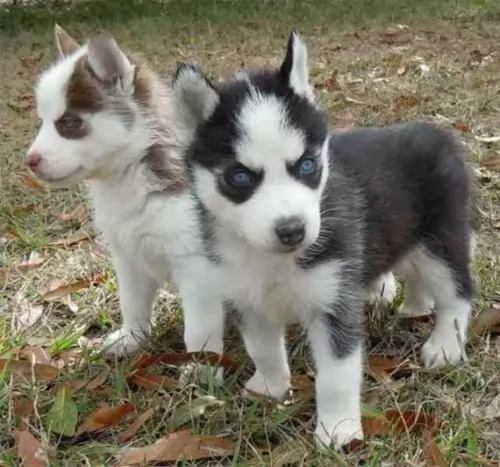 Your Miniature Siberian Husky is a healthy dog and you won’t have to spend too much money on him at the vet. However, just like with any other dog, he can battle with some of the common dog diseases -
Your Miniature Siberian Husky is a healthy dog and you won’t have to spend too much money on him at the vet. However, just like with any other dog, he can battle with some of the common dog diseases -
This eye problem affects about 10% of all Siberian Huskies and its not limited to old dogs. Juvenile cataracts can affect young dogs too. Luckily the problem isn’t painful for the dog.
Skin problems can be a concern for the Mini Siberian Husky, especially as one is used to seeing these dogs with thick coats. Follicular dysplasia is a genetic condition that causes patchy hair loss as well as a scaly, infected skin.
Check out that your dog is receiving nutritious food with vitamins and minerals as a zinc deficiency for instance can cause hair loss as well as skin problems.
 • Degenerative Myelopathy – a muscular neurological disease very similar to Lou Gehrig’s Disease or ALS. It is always fatal.
• Degenerative Myelopathy – a muscular neurological disease very similar to Lou Gehrig’s Disease or ALS. It is always fatal.
• Some have cardiac issues while others may have hip dysplasia or Von Willebrand’s disease.
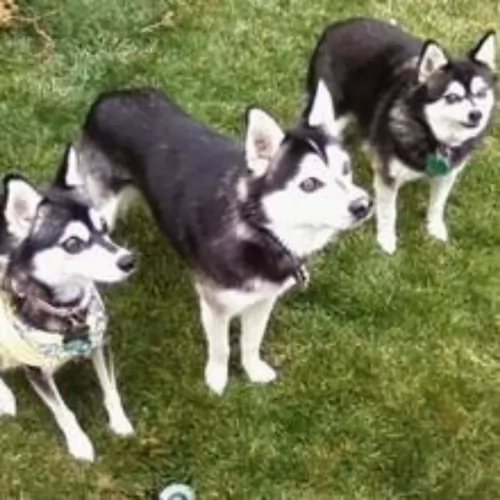 The Miniature Husky is an active and energetic breed that is going to require a lot of exercise. He is able to adapt to life in the city or the countryside but wherever you keep him as a pet, he will require regular daily exercise.
The Miniature Husky is an active and energetic breed that is going to require a lot of exercise. He is able to adapt to life in the city or the countryside but wherever you keep him as a pet, he will require regular daily exercise.
These dogs are used to cold climates so make sure your Mini Siberian Husky doesn’t overheat. Make sure that when he’s outdoors, there is shade for him and a water bowl. You’ll be doing him a real favor if you provide him with a small paddling pool to dip into on a hot day.
These are clean, odorless dogs that actually require little human help to be groomed. You can give your dog a good brush twice a week.
Mini Siberian Huskies, like the larger breed, have a high metabolism, so small amounts of highly nutritious food will do well with them. If you intend feeding your one commercially manufactured food, make sure its the high quality food that comes with plenty of minerals and vitamins. Try and avoid the low quality brands that come packed with unhealthy preservatives and colorants.
Dogs do well on simple, nutritious diets, so some boiled chicken, brown rice and raw and cooked vegetables such as carrots, potatoes and spinach added into the dry kibble from time to time will do him wonders.
Also try and include some raw meat into the kibble from time to time. That's it, as simple as that- no exotic, spicy foods and foods which we humans eat such as nuts, chips and chocolate – all can be toxic for your pet and just give him an upset stomach.
Make sure fresh, cool water is constantly available.
 1Feeding the puppy prone to overweight, the pem needs ½ to 1 cup of small breed high quality food in 3-4 meals per day. The Cardigan needs ¾ to 1 ¼ cups of high quality small breed food in 3-4 meals per day.
1Feeding the puppy prone to overweight, the pem needs ½ to 1 cup of small breed high quality food in 3-4 meals per day. The Cardigan needs ¾ to 1 ¼ cups of high quality small breed food in 3-4 meals per day.
2.Feeding the adult – Don’t overfeed them. The Pem need 1 cup per day of high quality small breed food in 2 meals per day. The Cardigan needs 1-1 ½ cups per day in one to two meals.
They are fast, athletic dogs. Agility, CAT, Barnhunt. Herding trials, flyball and they just love backyard ball fetching. Confirmation and obedience, along with rally.